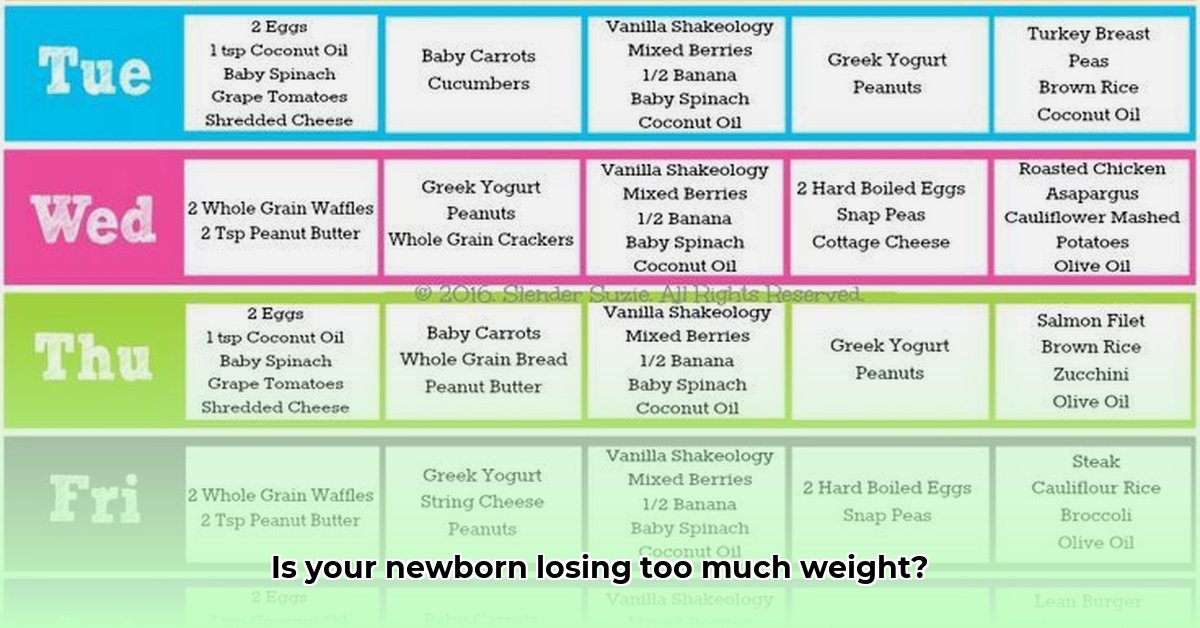
Having a new baby is a joyous occasion, but it also brings many questions, especially concerning your baby's health and development. One common concern is newborn weight loss. This guide provides a clear, step-by-step approach to calculating your baby's weight loss percentage and understanding what the results mean. Crucially, remember that this information is for guidance only and should not replace professional medical advice from your pediatrician. Always consult your doctor with any concerns.
How to Calculate Newborn Weight Loss Percentage
Most newborns experience some weight loss in the first few days of life. This is usually a normal part of adapting to life outside the womb. However, understanding the extent of this loss and its significance is crucial for ensuring your baby's well-being. Let's learn how to calculate this weight loss accurately.
Step-by-Step Calculation
Here's a straightforward method to determine your baby's weight loss percentage:
Step 1: Gather Your Baby's Weight Information
Record your baby's birth weight (BW) and their current weight (CW), ensuring both measurements are in the same units (ounces or grams).
Step 2: Calculate the Weight Difference
Subtract the current weight (CW) from the birth weight (BW): BW - CW = Weight Difference
Step 3: Calculate the Percentage Weight Loss
Divide the weight difference by the birth weight (BW), then multiply by 100: [(BW - CW) / BW] x 100 = Percentage Weight Loss (%)
Example:
Let's say your baby's birth weight was 7 pounds (approximately 3175 grams) and their weight after 3 days is 6.5 pounds (approximately 2948 grams).
- Weight Difference: 3175 grams - 2948 grams = 227 grams
- Percentage Weight Loss: (227 grams / 3175 grams) x 100 ≈ 7.15%
This baby lost approximately 7.15% of their birth weight.
Understanding Normal Weight Loss
Generally, a weight loss of 5% to 10% of birth weight in the first week is considered within the normal range. Most babies regain this lost weight by two weeks of age. However, individual variations exist, and what's "normal" can vary slightly depending on the baby. This is why regular monitoring and consultations with your pediatrician are so important. A rhetorical question for you: Is it always a cause for concern if a newborn loses more than 5% of their birth weight in the first week? The answer is no, but it's crucial to monitor the situation closely.
Interpreting Your Results and When to Seek Medical Attention
While the 5-10% range is a guideline, understanding what falls outside of it is vital.
Weight Loss Exceeding 10%: If your baby's weight loss exceeds 10%, contact your pediatrician immediately. This could indicate a problem requiring prompt medical attention.
Delayed Weight Regain: If your baby hasn't regained their birth weight by two weeks of age, schedule a checkup with your pediatrician. This is especially important if accompanied by other symptoms.
Other Warning Signs: Even within the 5-10% range, observe your baby’s overall behavior. Lethargy, poor feeding, excessive fussiness, or fewer than six wet diapers per day can warrant a call to the doctor, irrespective of the weight percentage. Dr. Emily Carter, Pediatrician at Children's Hospital, states, "The weight loss percentage is just one piece of the puzzle. Paying close attention to the baby's overall health, feeding habits, and hydration levels is equally crucial."
Factors Beyond the Numbers
While the percentage calculation is a helpful tool, it's crucial to consider other factors. Your baby’s feeding patterns, hydration status, and overall health contribute to their weight. The number itself doesn't tell the entire story. It's like looking at a single piece of a jigsaw puzzle; to get the whole picture, you need to consider other aspects, such as:
Feeding Behavior: Is your baby feeding effectively and frequently? This is a significant indicator of their growth potential.
Hydration: Is your baby well-hydrated? Dehydration can contribute to low weight.
Underlying Medical Issues: Sometimes, weight loss can be a symptom of an underlying medical condition. Only a doctor can assess this possibility.
Utilizing Digital Tools Wisely
Many apps and online calculators help parents track their baby's weight. These are useful tools for monitoring trends, but they shouldn't replace professional medical advice. They are supplements to, not substitutes for, the guidance of your pediatrician. Always ensure accuracy when entering data into these applications because incorrect input will lead to an inaccurate calculation. A fact-based assertion would be that using digital tools without the interpretation of a medical professional can be misleading and potentially harmful.
Conclusion: Consistent Monitoring and Professional Guidance
Monitoring your newborn’s weight is important, but remember that it's just one piece of the puzzle. Regular checkups with your pediatrician are absolutely essential for ensuring your baby's healthy growth and development. Trust your instincts—if you have any concerns whatsoever, don’t hesitate to contact your pediatrician. Early intervention can often make a significant difference.